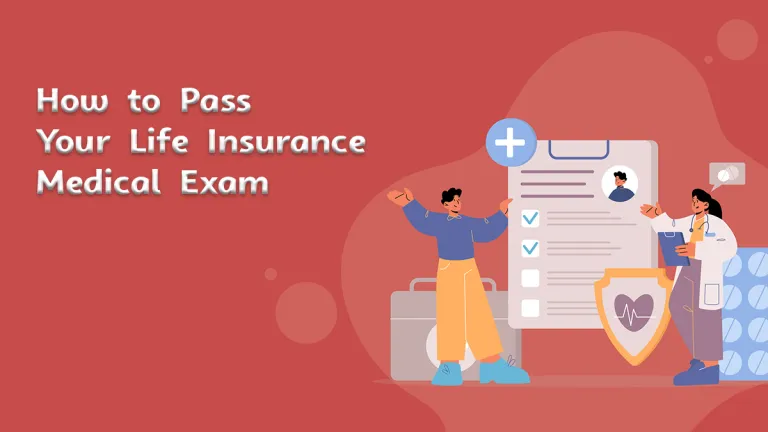
If you’re reading this article, it’s because you want to know how to pass your life insurance medical exam. Although the thought of scheduling a medical exam just to apply for life insurance might not seem appealing, don’t let the process get to you. These exams are usually quick, lasting around 15 to 45 minutes, and can be done at a location that’s convenient for you.
Knowing how you can easily pass a life insurance medical exam can increase your chances of getting a good quote for yourself. The exam is a basic physical that helps the insurance company assess its risk in covering you. While not every applicant needs one, most will.
We get it; medical exams aren’t exactly fun. But this guide will walk you through how to get ready and pass your life insurance medical exam, so the process feels easier.
What Is a Life Insurance Medical Exam?
A life insurance medical exam is a quick health check required during the application process to evaluate your overall health and assess the risk for the insurance company. The better your health, the lower your insurance rates, so this exam helps you secure the best deal.
Life insurance premiums are mostly based on your life expectancy. Being young and healthy always equals lower costs. However, even if you’re in good shape, it’s still important to prepare for the exam.
Everyday habits like too much coffee, not enough sleep, or intense exercise before the exam can impact your results, possibly making your health seem worse than it is. Luckily, you don’t need to change your entire routine to get good results. Just a few small adjustments in the days before the exam can make a big difference.
Where Can I Get a Life Insurance Medical Exam?
After applying for life insurance, a medical testing service like APPS or ExamOne will reach out to schedule your exam. You can usually choose to have it done at one of these locations:
- Your home
- Your workplace
- A medical testing center
While you won’t need to undress for the exam, you’ll still need to provide blood and urine samples. For more privacy, your home or a testing center might be better than your workplace.
What to Expect at the Life Insurance Medical Exam
The life insurance medical exam, often called a physical, is a quick and free part of the application process. An independent examiner (not your doctor) will visit you at your home or office at a convenient time. The exam usually lasts 15 to 30 minutes.
Here’s what happens during the exam:
Interview:
The examiner will review your medical history to ensure it matches what you provided on your application. Be ready to share contact details for your doctors.
Physical Exam:
- Height and weight measurement
- Pulse and blood pressure check
- Blood and urine samples
If you’re older or applying for a larger policy, you may need an EKG, chest x-ray, or cognitive test.
This helps the insurance company assess your health, placing you in a risk class. The healthier you are compared to others your age, the less you’ll pay for coverage. Those in average or poorer health may pay more based on their risk class.
How Should I Prepare for a Life Insurance Medical Exam?
In the weeks before the exam:
- Drink plenty of water: It helps flush out toxins and balances sugar and protein levels in your body.
- Cut down on salt: Too much salt can lead to dehydration and make your urine more concentrated.
- Eat healthy: Include whole grains, fruits, veggies, and low-fat dairy in your diet to lower blood pressure.
- Reduce your alcohol intake: Too much alcohol can raise blood pressure.
The day before the exam:
- Skip red meat: It’s high in cholesterol and could affect your results.
- Avoid over-the-counter meds like decongestants, which may raise blood pressure.
- Get a good night’s sleep: Less than six hours can increase your blood pressure.
On exam day
- Avoid caffeine: No coffee, soda, or tea, as they can raise blood pressure.
- Skip heavy exercise: This can elevate your blood pressure as well.
- Stay hydrated: It helps with easier blood and urine samples.
- Bring your ID: You’ll need a government-issued ID like a driver’s license or passport.
- Be ready with medical info: Prepare a list of your conditions, treatments, medications, and doctor contacts.
- Wear short sleeves: It makes it easier for the examiner to draw blood.
For your blood pressure reading, try not to have a full bladder or cross your legs, as both can raise your blood pressure by several points. Keep your feet flat on the floor for the most accurate reading.
Why Do I Need a Life Insurance Medical Exam?
A life insurance medical exam plays a key role in the application process for several reasons:
- Assessing risk: Insurers need to understand your health and medical history to estimate how long you might live. If you have health issues, the risk of an earlier death increases, which matters to the insurer.
- Pricing accuracy: The healthier you are, the longer you’re expected to live, which means lower premiums. An accurate exam ensures you pay rates that match your health risk.
- Determining eligibility: Some policies or coverage amounts may not be available if your health condition disqualifies you.
- Financial stability: Accurate health assessments help insurers price policies correctly. If high-risk individuals pay too little, the company might struggle financially. Overpricing low-risk individuals can also hurt their competitiveness.
- Preventing fraud: The exam helps insurers verify health claims made by applicants, preventing people from lying to get cheaper rates, which would lead to higher costs for everyone.
What to Do If Your Life Insurance Is Denied After the Medical Exam
If your life insurance application gets denied after the medical exam, here’s what you can do:
- Request Written Details: Ask for the specific reasons for denial. Review the explanation carefully to catch any errors.
- Check for Mistakes: Look for possible data entry errors or incomplete information that may have affected the results.
- Watch for False Positives: Sometimes, a test might show a health condition that isn’t accurate. Factors like food, stress, medications, or exercise could influence test results. If you suspect this, ask for clarification.
- Talk to Your Doctor: If the test shows something unexpected, like protein in your urine (which could indicate kidney issues), consult your doctor to confirm or rule out the condition.
- If Denied Due to Health: If your doctor confirms the test results, work on improving your health before trying again. Retaking the exam immediately may just lead to another denial.
Too many failed exams can hurt future chances of getting insurance, so avoid repeated failed attempts.
FAQs
Who pays for the life insurance medical exam?
The life insurance company typically covers the cost of the medical exam. You don’t have to pay for it, whether the exam takes place at your home, office, or a medical facility. It’s part of the underwriting process that helps the insurance company assess your health risk and determine your premium rates.
Can I get life insurance without a medical exam?
Yes, you can purchase life insurance without going through a medical exam. Many companies offer no-exam policies, which can sometimes be priced similarly to policies that require an exam, though some may cost more.
Two common types of no-exam life insurance are:
- Simplified issue life insurance: This involves answering a few health-related questions but doesn’t require you to go through a medical exam.
- Guaranteed issue life insurance: Has no health questions or exam, and you can’t be denied coverage.
No-exam options can be ideal for younger, healthier individuals seeking quick coverage.
Can I use my medical exam results for another life insurance application?
Yes, you can often use your medical exam results from one life insurance application for another application. If you had an exam done and then decided not to buy that policy, some insurance companies might let you use those results for a new application. For instance, Haven Life accepts medical exams from other companies as long as they were completed within the past two years.






